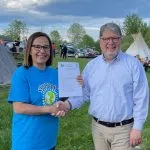
Moving past language politics is needed for language revitalization
If you only listen to Keisha Erwin, there’s no question they are Cree from Lac La Ronge Indian band; but when people see them, they start to question their identity and even whether they should be learning and speaking Cree.
Despite this challenge, Erwin has become a well-known Indigenous social media influencer, who teaches Cree on platforms including TikTok and Instagram.
Erwin says for older generations to see youth who care about the revitalization of Indigenous languages is important for communities because they need young adults to help show them it’s possible.
A full-circle moment while explaining their language journey learning nīhithaw – Cree, the Woodland dialect.

